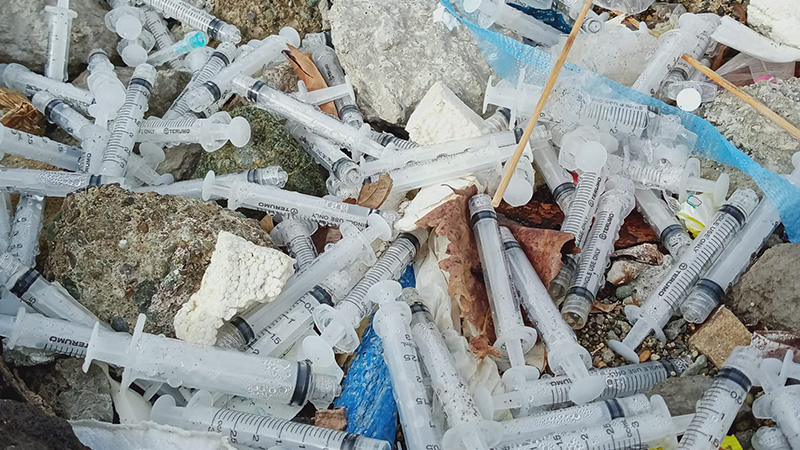
HEALTH HAZARD Hundreds of medical waste, such as syringes and blood sample tubes, are dumped at the shoreline of Barangay Concepcion in Virac, Catanduanes, on Jan. 24 and are believed to be cause of the COVID-19 infection of seven children who played with them. —PHOTO COURTESY OF ANTHONY ARCILLA
With an estimated 1,000 metric tons of health-care waste collected daily, the Department of Environment and Natural Resources (DENR) said it had been stepping up its coordination with local governments to ensure proper disposal.
Environment Undersecretary Jonas Leones said the amount of health-care waste collected increased during the pandemic, when face masks were made mandatory.
The health-care waste collected daily could fill up 166 six-ton trucks, Leones noted.
“What we are doing now to ensure collection is to boost our coordination with local governments, especially with the barangays. We need a stricter implementation of the Solid Waste Management Act, the segregation and collection,” Leones said at the Laging Handa briefing.
Responsibility of local governments
He said barangays are supposed to collect the health-care waste from households—which are supposed to segregate these —and then bring these to the temporary transfer station where they are collected by the municipal or city government.
The collected waste are then brought to a treatment facility before being transferred to the final disposal site, he said.
But the DENR official said the responsibility for handling health-care waste lies with local governments, and the DENR just provides them with assistance and guidance.
The department also reminded local governments to provide support to garbage collectors.
“We want local government units to procure [garbage collection services with contracts that] should include protection [for garbage collectors] so that they would not be infected with COVID-19,” Leones said.
Problem to worsen
But the problem is expected to worsen as the Duterte administration implements Executive Order No. 138, which transfers public services provided by the national government to local government without additional funding.
President Duterte signed EO 138 last June to dodge the cost of the Supreme Court’s ruling that the internal revenue allotments (IRA) of local governments should come from all national taxes and should be released automatically.
To reduce the cost of the ruling, Duterte administration “devolved” some services that it previously paid for and told local governments to use their IRAs which, the Supreme Court said, should be used for the special needs of local governments.
But the administration admitted that many local governments do not have the capacity to provide such services and only recently stared training them.
On Thursday, the Bureau of Local Government Finance of the Department of Finance said it was focusing on training local governments for the administration’s devolution transition plan.

